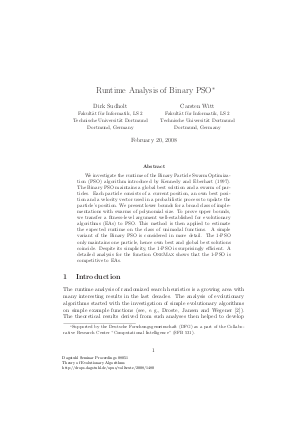Runtime Analysis of Binary PSO
Authors Dirk Sudholt, Carsten Witt
-
Part of:
Volume:
Dagstuhl Seminar Proceedings, Volume 8051
Part of: Series: Dagstuhl Seminar Proceedings (DagSemProc) - License:
 Creative Commons Attribution 4.0 International license
Creative Commons Attribution 4.0 International license
- Publication Date: 2008-05-06
File

PDF
DagSemProc.08051.6.pdf
- Filesize: 182 kB
- 22 pages
Document Identifiers
Subject Classification
Keywords
- Particle swarm optimization
- runtime analysis
Metrics
- Access Statistics
-
Total Accesses (updated on a weekly basis)
0PDF Downloads0Metadata Views
Abstract
We investigate the runtime of the Binary Particle Swarm Optimization (PSO) algorithm introduced by Kennedy and Eberhart (1997). The Binary PSO maintains a global best solution and a swarm of particles. Each particle consists of a current position, an own best position and a velocity vector used in a probabilistic process to update the particle's position. We present lower bounds for a broad class of implementations with swarms of polynomial size. To prove upper bounds, we transfer a fitness-level argument well-established for evolutionary algorithms (EAs) to PSO. This method is then applied to estimate the expected runtime on the class of unimodal functions. A simple variant of the Binary PSO is considered in more detail. The1-PSO only maintains one particle, hence own best and global best solutions coincide. Despite its simplicity, the 1-PSO is surprisingly efficient. A detailed analysis for the function Onemax shows that the 1-PSO is competitive to EAs.
Cite As Get BibTex
Dirk Sudholt and Carsten Witt. Runtime Analysis of Binary PSO. In Theory of Evolutionary Algorithms. Dagstuhl Seminar Proceedings, Volume 8051, pp. 1-22, Schloss Dagstuhl – Leibniz-Zentrum für Informatik (2008)
https://doi.org/10.4230/DagSemProc.08051.6
BibTex
@InProceedings{sudholt_et_al:DagSemProc.08051.6,
author = {Sudholt, Dirk and Witt, Carsten},
title = {{Runtime Analysis of Binary PSO}},
booktitle = {Theory of Evolutionary Algorithms},
pages = {1--22},
series = {Dagstuhl Seminar Proceedings (DagSemProc)},
ISSN = {1862-4405},
year = {2008},
volume = {8051},
editor = {Dirk V. Arnold and Anne Auger and Jonathan E. Rowe and Carsten Witt},
publisher = {Schloss Dagstuhl -- Leibniz-Zentrum f{\"u}r Informatik},
address = {Dagstuhl, Germany},
URL = {https://drops.dagstuhl.de/entities/document/10.4230/DagSemProc.08051.6},
URN = {urn:nbn:de:0030-drops-14800},
doi = {10.4230/DagSemProc.08051.6},
annote = {Keywords: Particle swarm optimization, runtime analysis}
}
